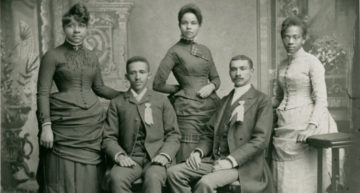Sean Wilentz in Lapham’s Quarterly:
 From the moment it appeared in April 1903, The Souls of Black Folk caused a sensation. Among black readers, James Weldon Johnson later claimed, it had the greatest impact of any book since Uncle Tom’s Cabin. William James, W.E.B. Du Bois’ undergraduate mentor at Harvard, dispatched a copy to his brother Henry, who privately praised it (a little backhandedly) as “the only ‘Southern’ book of any distinction published in many a year.” In Germany, Max Weber, whose lectures Du Bois attended while a student in Berlin, pronounced it a “splendid” effort and went to work finding a translator. Within two months, Du Bois’ American publishers had to arrange for a third printing, as the book became the subject of discussion in periodicals across the country, with the conspicuous exception of most white Southern newspapers and those controlled by the friends and supporters of Du Bois’ antagonist, Booker T. Washington. For a collection of mainly reworked, previously published essays on race relations and the Negro by a young black sociologist and historian at Atlanta University, it was an extraordinary success, unprecedented in the history of American letters.
From the moment it appeared in April 1903, The Souls of Black Folk caused a sensation. Among black readers, James Weldon Johnson later claimed, it had the greatest impact of any book since Uncle Tom’s Cabin. William James, W.E.B. Du Bois’ undergraduate mentor at Harvard, dispatched a copy to his brother Henry, who privately praised it (a little backhandedly) as “the only ‘Southern’ book of any distinction published in many a year.” In Germany, Max Weber, whose lectures Du Bois attended while a student in Berlin, pronounced it a “splendid” effort and went to work finding a translator. Within two months, Du Bois’ American publishers had to arrange for a third printing, as the book became the subject of discussion in periodicals across the country, with the conspicuous exception of most white Southern newspapers and those controlled by the friends and supporters of Du Bois’ antagonist, Booker T. Washington. For a collection of mainly reworked, previously published essays on race relations and the Negro by a young black sociologist and historian at Atlanta University, it was an extraordinary success, unprecedented in the history of American letters.
The flashpoint of controversy was the book’s third essay, “Of Mr. Booker T. Washington and Others.” Du Bois had once been an admirer of Washington—he had praised him for his famous Atlanta Compromise speech urging racial accommodation in 1895—but he had moved in a more radical direction over the previous five years. Du Bois’ objections were political: he was scornful of Washington’s circumspection about racial equality. But they were also cultural. Like Washington, Du Bois was dismayed by the debased condition of the Negro masses, barely one generation out of slavery, but Washington’s view was tainted by a fundamental pessimism about the worth of black people’s cultural resources.
More here. (Note: At least one post throughout the month of February will be devoted to Black History Month. The theme for 2022 is Black Health and Wellness)
